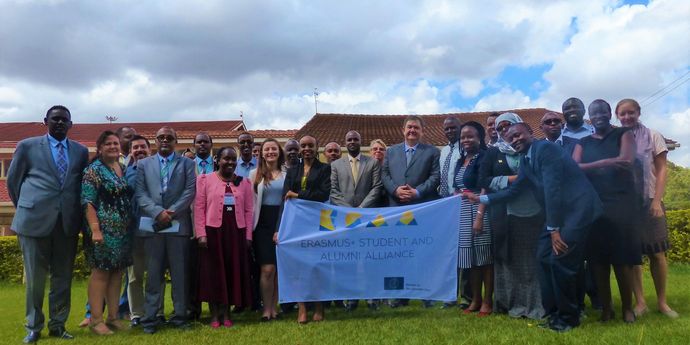News
Promotion of ERASMUS+ in Under-Represented Countries in Eastern Africa
A 2-day ERASMUS+ seminar held on the 11th and 12th of April 2019 at Kenyatta University in Nairobi, Kenya for university and government officials from 6 countries with little or no representation in the ERASMUS+ programme.
This pilot project aimed at promoting ERASMUS+ in Eastern African countries under-represented in the programme namely: The Comoros, Djibouti, Eritrea, The Seychelles, Somalia, and South Sudan. It was envisioned to serve as a launching pad for increased cooperation in the field of Higher Education between Eastern Africa and the European Union. The project was organised by the Eastern Sub-Regional Coordinator of EMA's African Chapter, Lina Mkoji, together with the region's former coordinator, Cornelius Okello, the External Representative of the OCEANS Network, Neringa Tumenaite, and supported by ESN. It was implemented in form of a 2-day seminar on the 11th and 12th of April 2019 at the Kenyatta University Conference Centre in Nairobi, Kenya.
The expert seminar gathered an audience of 25 including government officials, top university management and representatives from The Comoros, Djibouti, Eritrea, Somalia, South Sudan and Kenya - the host country; ERASMUS+ alumni; and the European Union. Institutions represented were: University Institute of Technology, Comoros; Cellule d'Appui à l'Ordonnateur National du FED, Comoros; University of Djibouti; Jomo Kenyatta University of Agriculture and Technology (JKUAT); Kenyatta University; Mount Kenya University; Pan African University Institute for Basic Sciences Technology and Innovation (PAUSTI); Ministry of Education, Culture and Higher Education of Somalia (MOECHE); Ministry of Education, Puntland; Puntland State University, Hargeisa University; University of Juba; the EU Delegation to Kenya; and the EU Delegation to Somalia.
The opening ceremony was graced by the Honourable Minister of State Abdirahman Mohamed Abdulle, Ministry of Education, Culture and Higher Education of Somalia; the EU Ambassador to Kenya Stefano Dejak; the Head of Cooperation of the Delegation of the EU to Somalia Maria Pilar Palmeri-Vaquero and a representative from KU's Vice Chancellor's office. To emphasise on the numerous opportunities of Erasmus+ in Africa and the potential of the project in fostering international cooperation and diversity, the Director-General Education, Youth, Sport and Culture Themis Christophidou, addressed the audience through a recorded video message. Through a prepared speech, the Education Division of the African Union articulated the various programmes it is spearheading within the continent.
The main objective of the seminar was to provide capacity building and to steer improvements in Higher Education in the region by promoting ERASMUS+ to the above mentioned countries which have little or no representation in the programme. Additionally, it purposed to create awareness about and make recommendations to the Intra-Africa Academic mobility programme, which is currently in the beginning phase. To achieve this, an elaborate 2-day agenda was prepared which included:
- Plenary discussions about international cooperation in Higher Education between Eastern Africa and the EU and what gets overlooked during the process of enhancing development and cooperation;
- Recommendations for policies that could support making International Credit Mobility and Erasmus Mundus more accessible for Eastern Africans;
- An introduction to ERASMUS+, ESAA, EMA, ESN and OCEANS and the support they give to Higher Education in Europe;
- Speeches and presentations about various ERASMUS+ opportunities and their benefits for African students and educational institutions;
- Testimonials from alumni sharing the benefits of studying abroad and the importance of youth exchanges, capacity building, and intercultural dialogue;
- Workshops on how to write competitive project applications for International Credit Mobility, Erasmus Mundus Joint Master Degrees, Marie Sklodowska-Curie Actions;
- Distribution of materials such as ESAA stationery, ERASMUS+ brochures and posters so that the participants can act as proxy "trainers" who would spread awareness about ERASMUS+ through their respective networks;
- Networking tea breaks, lunches and a cocktail dinner.
This project was aligned to the following clusters:
Cluster 1: Strengthening Higher Education Quality
Participants were keen on various quality assurance initiatives by the AU that are geared towards improvements in higher education within the continent e.g. HAQAA, AQRM.
Cluster 2: Spreading Erasmus+ and Widening Participation
The agenda aimed at raising awareness about ERASMUS+ programmes i.e. the workshops, information sessions, testimonials and materials such as brochures and online pages. Since the seminar was targeted at countries with little or no participation, it served as a steppingstone towards making ERASMUS+ a common household name in Eastern Africa.
Cluster 3: Increasing Social Inclusion, Empowerment, and Participation
Several aspects of this seminar contributed:
- There was participation from 5 out of 6 under-represented countries i.e: The Comoros, Eritrea, Djibouti, Somalia and South Sudan - which are home to some of the most marginalised communities in Eastern Africa.
- Participants comprised of government and top university officials, thus, the potential to widen participation and to create buy-in within the institutions.
- During planning, the project team had estimated a total of 2 participants from each of the 6 countries, however, Somalia was represented by a delegation of 7 from the 3 regions in the country, thus enhancing regional balance.
- Gender balance was taken into consideration - out of the 25 participants, 10 were women representing 40% of the audience. In the project team of 3, 2 were women.
- A discussion about hardships some students face in pursuit of higher education abroad also took place. The EMA Country Representative of Eritrea, who is currently a refugee living in France, shared his experience.
Cluster 4: Capacity Building
Knowledge sharing, networking and collaboration within the project team and with the participants will help to increase the institutional and volunteer capacity in the region. Discussions leading to 2 potential collaborations are underway.
Most of the participants heard about Erasmus+ programmes for the first time during the seminar. They were eager to learn about and to establish mobility agreements with each other, other African and European universities in the future. They are also expected to inform their students about Erasmus+ opportunities.


